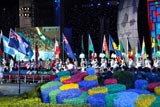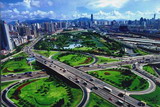Universiade holidays declared
Updated: 2011-07-22 13:39
(sz2011.org)
Public holidays were declared for Aug. 12 and 23, the opening and closing dates of the Universiade in Shenzhen, a press conference was told July 22.
Employees will have to work Aug. 6 and 20 (Saturdays) and Aug. 21 (Sunday), to have days off Aug. 11, 22 and 24.
Four consecutive days from Aug. 11 to 14 will be holidays, plus three consecutive three days from Aug. 22 to 24.
The holidays were approved by the State Council and will apply to all government departments and institutions, enterprises, schools and non-government organizations, according to Huang Guoqiang, vice secretary general of the Shenzhen Municipal Government and executive vice director of the executive office of the Games organizing committee, at the conference.
A total of 11,260 people from 141 countries and regions, including 7,557 athletes and 3,703 officials, had registered to attend the Games by 10 a.m. July 22.
“By yesterday (July 21), 309 media organizations from home and abroad, totaling 3,018 journalists, had confirmed they will cover the Games,” said Huang.
A total of 268 journalists from 119 overseas media are coming to Shenzhen, including Reuters, AP, ABC and NBC, Huang said.
In addition, 60,000 motorists have indicated they will stop or reduce the use of motor vehicles during the 11-day Games.
The organizing committee will set up 23 ticket offices near Games venues with 160 counters. But Huang said no tickets will be sold for the opening and closing ceremonies.
Huang is one of three full-time spokespersons for the Games.
The other two are Pan Xiaohui, a communications professor at Shenzhen University, and Wang Mei, a well-known news anchorwoman from Shenzhen Media Group.
Video

Working as a Universiade volunteer

Party starts as Universiade ends

Sumptuous seafood in Shenzhen

Athletes test doping knowledge
About Shenzhen

